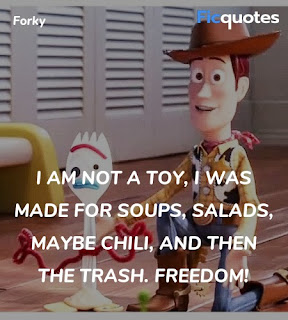(Guest Post by Mike T)
I don’t cry during movies. Saving Private Ryan, Schindler’s List, Titanic, The Pianist, Lion King… fantastic movies, but I reign it in, look up a little bit, take some deep breaths, and usually succeed in keeping a dry face. But I do not watch Toy Story 4 around people who aren’t ready to see me weep. What is it about the Toy Story movies? How do these animated full-tilt fantasy films grapple with the most fundamental and realistic questions about what it means to be human? They are a singular achievement in film, technologically and creatively. And Toy Story 4 is the best of them.
The first three Toy Stories bravely tackle the difficult themes of childhood, sentience, memory, free will, purpose, and connection. The last film does something almost unimaginably ambitious - in addition to the prior themes, it attempts to explore more fully the idea of creation, self-hatred, and intrinsic worth. In a children’s film. If you asked me to do that, as a writer, I would throw in the towel. Immediately. But these geniuses at Pixar make it look easy, and they do it with one character - Forky. You’ve probably noticed my love of hyperboles, and I’m about to throw one more at you: Forky is one of the most important characters I have ever seen in film.
For those in need of a brush-up, Forky is made from trash. Woody, who is feeling less and less useful to Bonnie, decides (of his own accord) to accompany her to her orientation day of kindergarten. As Woody predicted, Bonnie struggles in a new and unfamiliar environment. When her craft materials get stolen, Woody sneakily produces some new craft materials from the trash can. Bonnie looks around, wondering who her secret benefactor might be, and then gets to work making something new out of the materials. Forky is born. Of course, he doesn’t talk until he’s only in the presence of other toys, but his first words are bold and decided: “TRASH”. Thus ensues Woody’s challenge to protect Forky (and Bonnie, who is by now passionately attached to her creation) from his insatiable desire to fling himself back into the waste-basket.
When I first watched all this, I almost couldn’t believe what I was seeing. Was this kids’ movie really going to be driven by one character trying to prevent the suicide of another character by convincing him of his intrinsic worth to his creator? Forky never says he hates himself - that might be overstepping for a kids film. But he fully believes he is trash, and he is ready to go back to the trash. He cannot comprehend that his very existence - literally, just sticking around and being there - is so deeply important to his creator. Forky is not beautiful. His eyes are different sizes, there’s a greasy stain on his face, and his arms continuously threaten to completely fall off of his body. But to Bonnie, Forky represents something: her own ability to create, her ability to pass value into something simply by wanting it so. Love is her creative force. In a touching conversation, Woody guides Forky down a long, dark street (at times dragging him), all the while trying to make the case for Forky’s immutable value in Bonnie’s eyes.
I remember as a small kid (maybe 5 or 6), I was brought to tears when I realized I had to throw away my popsicle stick after I ate the popsicle. For some reason, the idea of subjective experience chose that moment to turn on in my brain, and I couldn’t help feeling like this poor popsicle stick didn’t deserve to be abandoned. How could I just discard something that had its own existence? More importantly, if this stick was worthy of nothing but the trash, where was my promise that I deserved anything better? In much of my life, patterns of self-loathing became the norm. My brain defaulted to criticizing myself and refusing to believe others could love me. It wasn’t the best situation, but it’s what I was familiar with - trusting others was terrifying, accepting my own potential was terrifying… because they both take work. A lot of it. Being a human takes work. But our value is already born inside of every one of us. We are much, much more than trash. We are capable of love and inspiring love, and God desperately wants us to feel His love. He wants us to love him back. More times than I can count, Christ has all but dragged me down a long, dark street, promising and promising that somewhere in me was something more beautiful than I could comprehend.
I know, I know. There’s a chance I’m reading too much of my own story into all this, but I think that’s precisely the beauty of a great screenplay.
“Why do I have to be a toy?” Forky asks.
“Because,” says Woody, “you have Bonnie’s name written on the bottom of your sticks."




No comments:
Post a Comment